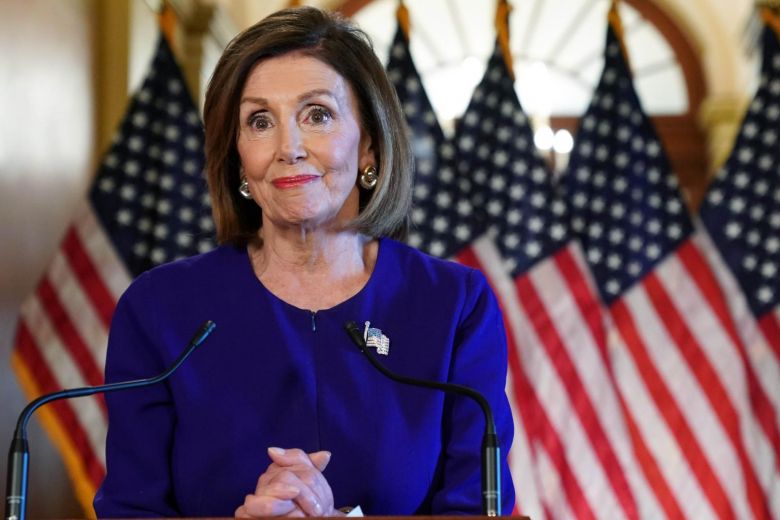De-escalate tension in the East China Sea
In what was widely viewed as a highly controversial move, the Speaker of the United States House of Representatives, Nancy Pelosi, last week visited Taiwan as part of her tour of states in the Southeast Asia region. The visit comes 25 years after Newt Gingrich, another American speaker, paid a similar visit to the island […]

US Speaker, Nancy Pelosi
In what was widely viewed as a highly controversial move, the Speaker of the United States House of Representatives, Nancy Pelosi, last week visited Taiwan as part of her tour of states in the Southeast Asia region. The visit comes 25 years after Newt Gingrich, another American speaker, paid a similar visit to the island state in 1997.
As the third-ranking public official in the American political hierarchy, Pelosi’s visit was controversial—even provocative—principally because it runs against the one China policy espoused by the United States of America as well as the overwhelming majority of countries in the world.
- Shooting range: Residents flee as army bullets hit homes in Ibadan
- Police order hawkers to vacate Lagos-Ibadan Highway long bridge
It is a well-known historical fact that the Taiwanese people are ethnic Chinese, and that the island has been recognized as part of Mainland China for centuries. The civil war in China following the end of the Second World War between the communist forces led by Mao Zedong and the Nationalists led by Chiang Kai-Shek, resulted in the latter fleeing in defeat to Taiwan in 1949. The Nationalist party has since then dominated the politics of the island in defiance of the communist government of Mainland China.
Inevitably, Taiwan has become a major flashpoint in the post-Second World War ideological battle between the communist order led by the defunct Union of Soviet Socialist Republics (USSR) and China on one hand and the capitalist order led by the United States of America and its allies on the other. The United States and its allies sought to recognise Taiwan as the representative of the Chinese people and even supported and promoted its claim to permanent membership of the United Nations’ Security Council along with the US, USSR, Britain and France.
But it was inevitable that this anomaly will not be allowed to stand as member countries of the United Nations overwhelmingly passed Resolution 2758 on October 25, 1971, to recognise the Mainland Peoples Republic of China as “the only legitimate representative of China to the United Nations’’. The United States, too, has since recognised China and has publicly said it supports the “One China” policy.
Still, successive US administrations over the years have pursued what some in the American foreign policy establishment call “strategic ambiguity” by openly supporting the “One China” policy and working with China on many issues of common interests, while at the same time, tacitly encouraging Taiwan in its continued defiance of the mainland government in China and the United Nations. The US does this through a variety of ways, including arming Taiwan and supporting its diplomatic push to gain recognition from countries around the world by exaggerating its claims as a democracy. Pelosi’s visit is the latest example of such acts of US attempts to undermine China’s sovereignty over the island and UN resolutions.
Leading the global chorus for restraint on this needless controversy was the UN Secretary-General Antonio Guttieres who cautioned that “the world was one miscalculation away from a nuclear confrontation’’. This was in reference to the swift and massive mobilisation of Chinese troops around Taiwan and the corresponding action by the US and Japan in moving military platforms to the area.
A confrontation between China and the US over Taiwan will no doubt have unimaginable consequences to the world economy and security, due to China’s ubiquitous reach and pivotal importance to the health of the global economy. It stands to reason that a disruption in the flow of Chinese goods, services and trade in the world will grind many countries to a halt, especially at a time when the world is still reeling from the effects of the ongoing war between Russia and Ukraine.
That is why Pelosi’s visit to Taiwan, under the circumstances, was insensitive, provocative and reckless. Indeed, the American Joint Military Chief of Staff, General Mark Miley and the Director of the Central Intelligence Agency (CIA), William J. Burns, both reportedly advised against it as it was capable of needlessly raising the already tense situation in the area leading to avoidable actions.
It is a matter of profound regret that, oftentimes, American leaders tend to pursue narrow foreign policy goals that do not take into account the wider implications of their actions on the world. Regrettably, it has been observed that this has become the forte of Democrat-run administrations, which in itself is a contradiction of sorts as they are thought and expected to be more humane as a political party of minorities and diversity than their Republican counterparts, who are often seen as being more of the white establishment. With President Joe Biden’s truculent posture in the Russia-Ukraine war and now Nancy Pelosi’s ill-advised and dangerous caper in Taiwan, it would seem the Democrats are bent on promoting trouble rather than peace.
As the world teeters on the brink of another confrontation, this time in the East China Sea, we call on all parties to exercise restraint in order not to escalate the situation to dangerous, unmanageable levels. While condemning the actions of Nancy Pelosi, we also call on the government of Mainland China to seek ways of constructive engagement through dialogue and less feisty postures with the Taiwanese so as to resolve this knotty issue which has stymied the development of full mutually beneficial relations between people of same ethnic and cultural identities.
